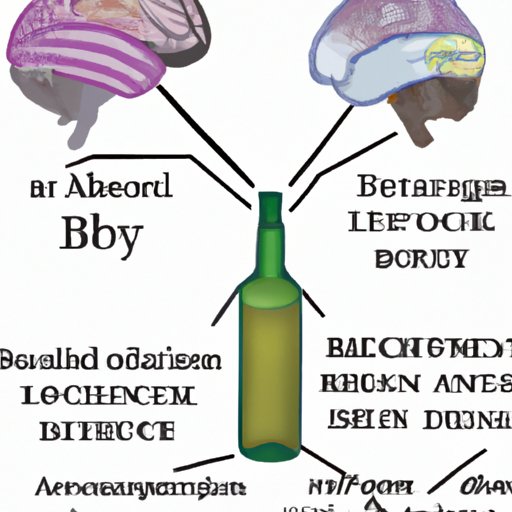Introduction
Alcohol is one of the most widely used recreational drugs in the world. It is found in many different forms, such as beer, wine, spirits, and liqueurs. While it is often seen as a social lubricant and an enjoyable part of celebrations and gatherings, it is important to understand the effects that alcohol can have on our bodies and minds. This article will explore the science behind alcohol and provide a comprehensive overview of how alcohol works, its chemical composition, and the long-term effects it can have on the brain and body.
Exploring the Science of Alcohol: How Does Alcohol Work?
The active ingredient in alcoholic beverages, ethanol (C2H5OH), is a type of alcohol, or more specifically, a psychoactive drug. Alcohol is created when yeast ferments the sugars in food or drinks, such as grapes in wine or grains in beer. The process of fermentation produces ethanol, which then makes up the majority of the drink’s volume.

The Chemistry Behind Alcohol: A Look at What Happens When We Drink
When we consume alcohol, it passes through our digestive system and is absorbed into our bloodstream. From there, it spreads throughout our bodies, including our brains. The rate at which this happens depends on various factors, such as the type of alcohol consumed, the amount consumed, and the individual’s body weight. Once the alcohol is in the bloodstream, it is metabolized by the liver and broken down into acetaldehyde, a toxic compound, and then further broken down into acetic acid. Acetic acid is then further broken down into carbon dioxide and water, which are then expelled from the body.

Unpacking the Effects of Alcohol on the Brain and Body
The effects of alcohol on the brain and body depend on several factors, such as the amount consumed, the individual’s body weight, and their general health. Some of the immediate effects include slurred speech, impaired balance and coordination, and slowed reaction time. As the alcohol continues to circulate through the bloodstream, it affects other areas of the body, such as the heart and the digestive system. In the long-term, alcohol consumption can lead to a range of physical and mental health issues, such as liver disease, cancer, hypertension, and depression.
Do All Types of Alcohol Have the Same Effect?
While all types of alcoholic beverages contain ethanol, they do not all have the same effect. Different types of alcohol have different levels of potency, with some being much stronger than others. For example, beer typically has an alcohol content of around 5%, while spirits such as vodka, whiskey, and rum can have an alcohol content of up to 40%. This means that consuming the same volume of each drink could have very different effects on the body.
Examining the Role of Genetics in How Alcohol Affects Us
Recent research has suggested that genetics may play a role in how alcohol affects individuals. Studies have shown that certain genetic variations can influence an individual’s sensitivity to alcohol and their ability to tolerate it. For example, some people may find that they become intoxicated more quickly than others due to their genetic makeup. It is important to bear in mind that this varies significantly from person to person, so it is always best to drink responsibly and know your own limits.

Debunking Myths About How Alcohol Works
There are many myths surrounding alcohol and how it affects us. One common misconception is that drinking coffee or taking a cold shower can sober you up. Unfortunately, this is not true. According to Dr. Mary Claire O’Brien of Wake Forest University School of Medicine, “Alcohol is metabolized by the liver and nothing can speed up the rate at which it is eliminated from the body.”
Exploring the Long-Term Consequences of Drinking Alcohol
Drinking alcohol can have serious long-term consequences on both physical and mental health. Over time, excessive drinking can lead to a range of physical health problems, such as liver damage, cardiovascular disease, and certain types of cancer. Additionally, it can increase the risk of developing mental health issues, such as depression and anxiety.
Conclusion
This article has explored the science behind alcohol and provided an overview of how alcohol works, its chemical composition, and its potential long-term effects on the brain and body. It is important to be aware of the risks associated with alcohol consumption and to drink responsibly. Ultimately, the effects of alcohol will vary from person to person and should be discussed with a doctor if any concerns arise.
(Note: Is this article not meeting your expectations? Do you have knowledge or insights to share? Unlock new opportunities and expand your reach by joining our authors team. Click Registration to join us and share your expertise with our readers.)
